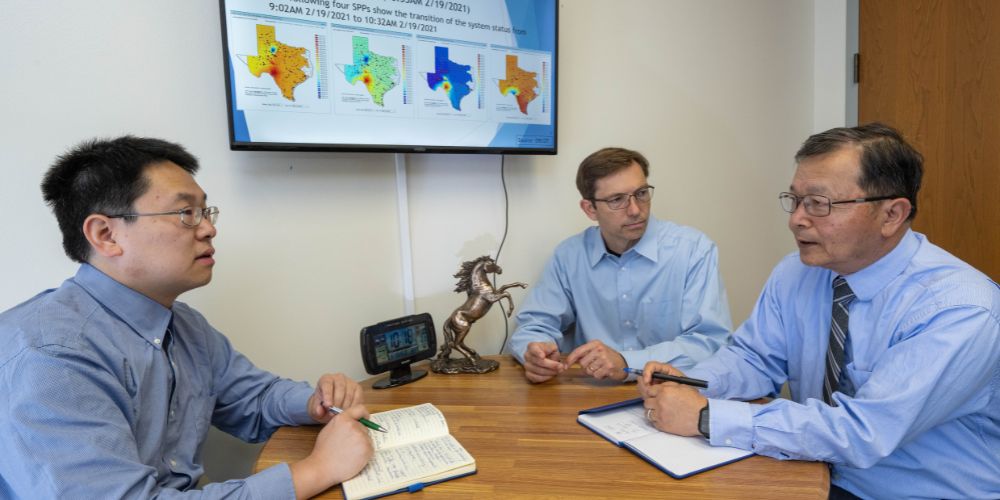Supporting Texas Power

A group of University of Texas at Arlington researchers has received a federal grant to find ways to increase the reliability and resilience of the Texas power grid, provide relief from power transmission congestion, reduce customer bills and facilitate the production of Texas clean energy.
UTA is partnering with the Pacific Northwest National Laboratory (PNNL) on this grant and will provide support for the ongoing Texas Aggregated Distributed Energy Resources (ADER) Pilot Project.
“We are very excited to have received this grant,” said Yichen Zhang, principal investigator and assistant professor in the Department of Electrical Engineering. “This project has the possibility to support the Texas power grid and benefit the people of Texas.”
This work will be supported by a $1.6 million Biden-Harris Administration grant, with the goal of improving regional and state wholesale electricity markets.
The team will primarily look at the viability of adopting ADER into wholesale electricity markets, specifically in the Electric Reliability Council of Texas (ERCOT). ADER is the aggregation of behind-the-meter energy devices and capabilities that can be called upon to accomplish an action, such as reducing energy consumption or providing more energy.
This includes looking to develop Emerge-ADER: Energy Market Evaluation and Resource Planning for Grid Evolution with Aggregated Distributed Energy Resources, a holistic bottom-up ADER planning platform.
“Distributed energy resources are a key component of the transition to a more secure, clean and resilient energy future. Leveraging their flexibility, diversity and distributed nature, the ADERs enable their participation in the wholesale energy markets. It also enhances market efficiency, reliability and sustainability,” said Wei-Jen Lee, interim chair of the Department of Electrical Engineering.
“The capabilities of distributed energy resources to support the larger grid have been sitting dormant for a long time, and I’m glad to see the right partners coming together to bridge the gap and make this possible,” said Chris Boyer, associate professor in the Resource and Energy Engineering Program.
Peter Crouch, dean of the College of Engineering, said as the Dallas-Fort Worth Metroplex continues to grow at a rapid pace, the strain on the electric grid will only increase.
“This research is an important step in understanding how to ensure that Texans will have access to power during extreme weather events, preventing loss of revenue and lives,” Crouch said.
Addressing the needs of the industry is key to the project. The team will closely coordinate with the Texas ADER task force to support its ongoing pilot project. The Texas ADER Task Force consists of utilities, utility commissions, independent system operators, aggregator providers, retail electric providers and more.
Feng Pan, senior researcher at PNNL, said they are thrilled to be part of this unique collaboration between leading institutions in academia, national laboratories, industry and state agencies aimed at advancing ADER.
“PNNL brings to the table its cutting-edge electricity market simulation framework, including the HIPPO simulation framework, coupled with extensive experience in optimization modeling and high-performance computing. These resources will be instrumental in supporting the ADER research initiative and the ongoing ADER Pilot Project in Texas.”
“The project objectives are highly aligned with our task force,” added Jason Ryan, executive vice president for regulatory services and government affairs at CenterPoint Energy and the ADER task force chair. “We look forward to the success of this project in partnership with the Emerge-ADER team and the Department of Energy Grid Deployment Office as significant for future deployment of ADERs in Texas.”